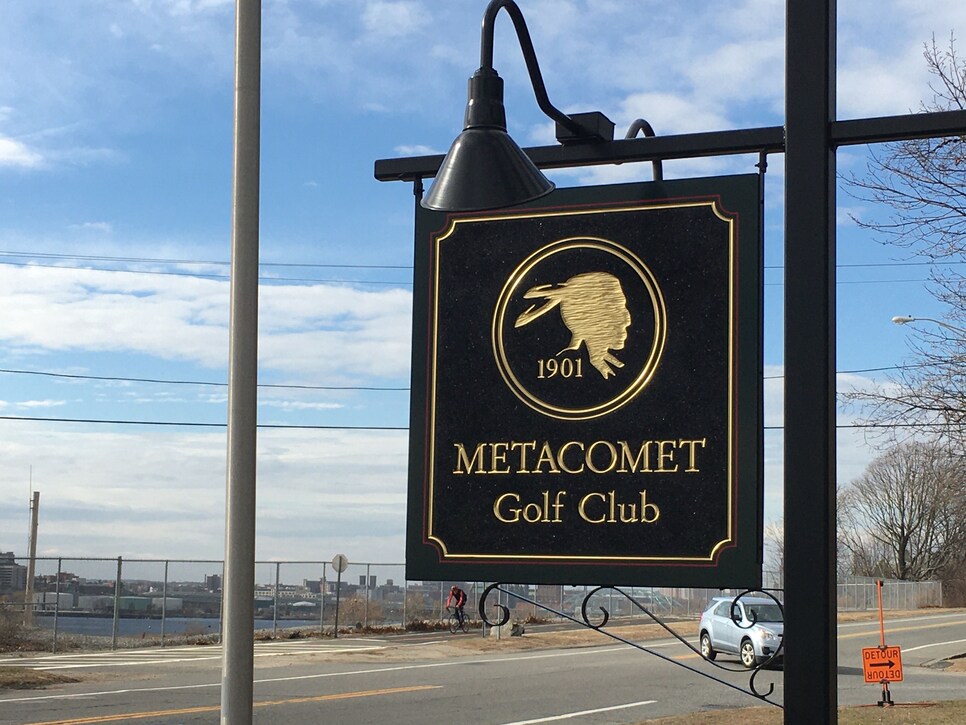News
Brad Faxon saved his childhood club. Members are now suing him for fraud. The curious case of Metacomet Golf Club

Editor’s Note: Metacomet Golf Club is closing on Sept. 30. The club’s owners, Marshall Properties, are engaged in a zoning battle with the city council and community activists. Marshall withdrew its zoning request hours before it was to be put for a vote on Sept. 25, blaming “rumor and misinformation” for the backlash regarding its proposal for Metacomet.
Though activists considered the withdrawal a victory, Marshall promised to go along with its “Plan B” for the site. Below is Golf Digest’s reporting from March on the circumstances that led to this fate.
Ryan Porter drags on a cigar from his porch. A former mini-tour player, Porter is contemplative as he puffs into the cool March evening. His house sits a par 5 away from the shores of Narragansett Bay. His beloved course is even closer.
“I’ve made it from my driveway to the Met’s parking lot and the clock hasn’t changed on the dashboard,” Porter, 40, states.
He says it with a pride that lingers in the heavy New England air. It is also baked in melancholy. It is a drive, Porter notes, he won't be making anymore.
• • •
“The Met” is Metacomet Country Club, a 105-acre course nestled between the bay and Watchemoket Cove in Providence. Although the club was founded in 1901 on a site in Rumford, R.I., it moved to its current locale in 1919. Leonard Byles developed the original layout but Donald Ross was tapped in 1924 to redesign the course. Ross, so the story goes, was apoplectic at what stood before him.
“Ross allegedly said, ‘You want me to build a course here? It’s on the side of a hill!” says Doug Nani, whose family has been a part of the club since the 1950s. “But boy did he make it shine.”
Ross conquered his topography reservations, rerouting Metacomet over and against the property’s ridges. The overhaul worked: By 1926, Ross produced a course filled with character, beauty, fun and challenge. With an emphasis on challenge.
Predominantly a men's club, Metacomet weighs in at 6,500 yards from the tips, par 70. Inviting as that distance may be in the modern game, Ross’ design has proven timeless, the course’s tight confines and countless bunkers making it delightfully punishing. That’s before grabbing your putter. Metacomet’s greens are big and undulating and sloping, firm and fast and its edges shaved. They are like the Marines, rejecting anything less than right.
“Every club likes to say they have the best greens,” says Michael Pirri, a former member and contributor to NortheastGolf.com. “We didn’t need to do that. Our guests would let us know. When they were double-cut and rolled, forget it."

In spite of that difficulty, or perhaps because of it, Metacomet became known as a player’s joint. Half of the 230-something members held single-digit handicaps, and the Met annually roasted other clubs in the state’s intra-club tournament, winning last year’s event by 14 shots, gross.
“We just dominated, as a team and individuals,” Porter says. “The only time one of our guys wouldn’t win is in July when local or homegrown college players would enter.” Adds longtime member Michael Trainor: "The Met made you a better player, because you had to be."
The members themselves reflected the blue-collar anatomy of the town. There were lawyers and bankers, sure, but they teed it up with small-business owners, teachers, police officers. It was not a club awash in old money, and yet anyone who was anyone in Providence was there.
“It was golf, unadulterated,” says Trainor, president of Trainor & Sons Funeral Home in Warwick, R.I. “Damon Runyon couldn’t make up the cast of characters that ran through the years. For someone that eats, drinks and sleeps golf, it was the club to belong to. It’s paradise.”
Unfortunately, paradises are not immune to the burdens of reality. In the past decade Metacomet was besieged by financial difficulties. How these woes came to be remains a source of debate. Some members chalk it up to changing Providence economics (Rhode Island home prices had the fifth largest percent decline since the 2008 recession, according to the Federal Housing Finance Agency). Others assert Metacomet, just minutes from downtown, was the victim of suburban flight. A vocal contingent claim the wounds were self-inflicted by club mismanagement.
What’s unquestionable is Metacomet faced the prospect of foreclosure in 2019.
“The president of the club at the time, Eric Churchill, called a meeting two falls ago and said we can’t sustain this anymore,” Nani says. “It was debt, it was bills, membership was low…[Churchill] said we think the right thing to do is put the club up for sale.”
Leisure Investment Properties Group, which specializes in golf and recreational property sales, listed Metacomet at $3.5 million in October 2018. Members were assured whatever ownership was brought in would keep Metacomet a golf course; however, Nani says of the 40-odd groups that looked to purchase Metacomet, few could promise to keep it private. The club headed into winter not knowing if spring would come for Metacomet.
Then a savior emerged. A familiar face at that.
• • •
Growing up just outside of Providence in Barrington, R.I., Brad Faxon made a name for himself in the Ocean State at 14 by winning the Rhode Island Junior. State amateur titles followed. The Rhode Island golf scene is largely ignored by college recruiters, which is how Faxon wound up at Furman University in Greenville, S.C. He graduated as a two-time All-American, member of the 1983 Walker Cup team and winner of the Haskins Award for the country's most outstanding collegiate golfer. Faxon went on to enjoy a prosperous PGA Tour career, making over 700 starts, eight wins, two Ryder Cup appearances and $17 million in earnings. It was a longevity credited to his short game, widely regarded as one of the best putters in the sport's history.
In a state short on golf dignitaries, the resume alone qualifies Faxon as an icon. But it's Faxon's labor outside-the-ropes that makes him adored.

Hunter Martin
Faxon teamed up with Billy Andrade in 1991 to form the Billy Andrade/Brad Faxon Charities for Children, Inc., a non-profit for children in need in Rhode Island and southern Massachusetts. Since 1999 he and Andrade have hosted the CVS Health Charity Classic at Rhode Island C.C. in Barrington, raising over $22 million for local organizations. He helped fund and co-chairs Button Hole, an inner-city executive course in Providence designed for juniors, and gives an annual clinic. When Furman announced in 2014 that it was disbanding its golf program due to a lack of resources, Faxon spearheaded a fundraising drive to save the team. Within three weeks, the program was reinstated.
"I grew up in Barrington, Brad was my idol," Porter says. "Brad was why I felt like becoming a pro and potentially trying to play golf for a living seemed real. Any of us who are in golf in this area view Brad like a golf god." Echoes Nani: "[Faxon's] generosity, it's been incredible. He's been so good to the community."
A community that includes Metacomet. Faxon grew up on its grounds: His father was a member, and Brad took lessons from Metacomet club pro Joe Benevento. The Faxon clan was lethal at father-son events, and Brad was a one-time club champ.
"It was where I spent many years as a kid, a high schooler," Faxon says. "I still have plenty of in-laws that belong to the Met."
Part of the Metacomet mystique is that its notorious greens molded Faxon into the short-game savant he is. So when rumors spread of Faxon's interest in purchasing the club in early 2019, members felt it was, well, providence.
Better yet, one of Faxon's partners was Steve Napoli, whose reputation is likewise sterling among the Rhode Island golf populace. Napoli is a former pro at neighboring clubs Wannamoisett and Pawtucket as well as New Jersey's Liberty National, and serves as the men's golf coach for the College of the Holy Cross. He is a no-nonsense leader, yet Napoli is renowned for his efforts with juniors and proteges. He is decorated in the PGA of America ranks and was bestowed the Bill Strausbaugh Award, one of the organization's highest honors for mentorship and service, in 2003.
Faxon and Napoli were joined by three other investors: Brendan VanDeventer, Tim Fay and Karl Augenstein. By March, members were informed via email of the impending sale; later that month, Faxon walked Metacomet with Gil Hanse's design team, examining possible improvements to the course.
The investors, now known as the Metacomet Property Company, acquired the club on April 8, 2019. According to the Providence Journal, tax records show Metacomet Property Company paid $750,000 for the course, with both sides telling the Journal the deal included more than $2 million in debt and back taxes. Following the sale, MPC issued its mission statement to the club: “To preserve and maintain the Metacomet Country Club (“MET”) as an original Donald Ross designed championship golf course for the benefit of its membership (both existing and new) and for the game of golf for generations to come.”
"We viewed it as, wow, you couldn't possibly have a better group, right?" Porter says.
Porter then goes quiet, and the silence that follows is suffocating.
• • •
The Met would not go unchanged. While the MPC promised the integrity and soul of Metacomet would remain intact, it was likewise unequivocal that flexibility from members was essential. The clubhouse was in need of repair, and to boost dwindling membership numbers, a limited amount of tee times would be made available to the public (thus changing the Met from country club to golf club). Though it's a common practice around the globe, semi-privatization remains taboo for American clubs. Over a dozen members said there was pushback on the "member for a day" initiative, but reason eventually won out. The biggest proposal: Turning the 11th hole, and possibly 12th, into condominiums.
Drastic as that sounds, there was little resistance from the members. They bought in.
“We were on the verge of going out of business, and here comes Brad to save the day,” Trainor says. “Whatever reservations we had died pretty quickly. Hanse was going to come in and re-route the course. Hey, we were happy just to be breathing, and he and his group are promising us the world."
"It was logical," adds Porter. "It was, hey, we're not going to do it right away, but we're probably going to build some condos on 11, because that would be overlooking the river. And we could re-route the 11th hole and maybe change 12 a little bit, because 12 is an absurdly long par-3. There's a ton of dead space [in those areas]. Quite frankly, they could have dropped a pool over there and made it a family club."
Members said the transition was relatively smooth at the start. However, prolonged spring weather correlated to a sporadic summer, a situation members say the club was not prepared for. With rounds played down, ownership informed members it was increasing public play, the first signal to members that something was not right.
"On the Fourth of July, members could barely get a tee time," Porter says. "There was supposed to be restricted windows, but everyone felt like those windows were being ignored."

The club addressed the growing concern in an email dated Aug. 16. “As we have had less than 4,400 member rounds played YTD, we have been increasing the level of non-member play to help support the operation,” reads the email, obtained by Golf Digest. “We will continue to monitor the amount of play on the golf course and modify the time restrictions as needed.”
It was not a welcomed announcement. "No person in their right mind would say, 'Oh, I'm going to pay to join a semi-private club,' when they could just do the 'member for a day' program, which was a member for a day all year if you wanted and pay $70 to play when you want," Porter says.
Other problems emerged. New kitchen help caused issues with the restaurant, according to Nani. Strangely, there were rumors of new membership snafus, members said.
"What I can tell you that was alarming throughout the year is some people would call with interest in joining, and they wouldn't hear back," Porter says. "That had people starting to ask questions." This could have been fueled by an out-of-date website, which members acknowledged needed revamping.
Still, trust remained high in the "Faxon Five." "Guys weren't happy about things, but they were accepting it because it was needed to keep the course going, and they believed in the mission that these guys had," Porter says. Especially after a Nov. 18 meeting in which the partners—Faxon over the phone, the other four in the room—presented what they had in store for Metacomet. Members said the presentation was a success, infusing positivity and hope for the upcoming season.
The club emailed a summary of the meeting on Nov. 27. Those who attended say the bullet points are consistent with what was pitched. Included in the synopsis was the club staying open during winter months, an introduction of a non-resident membership, a promise to relaunch the club’s website, and a reduction of 3,000 public, reciprocal and non-member rounds. At the top of the list was this item:
Real Estate Development - We have not made any real estate plans to date, nor have we set any timeline to do so. Our initial task is to stabilize the club, retain existing members and grow the membership.
Nothing much was thought of it. As multiple members relayed, the club was transparent in wanting, eventually, condos on the property; this was a non-update update. Besides, with the club's future secured, the focus of the Metacomet men was elsewhere.
"After a rough spring and summer, we had an easy winter, so we were going to get at it early," Trainor says.
Those ambitions were torched on Feb. 20 when the club made a surprise announcement: The owners were discussing a sale of the property. A week later, MPC entered a purchase and sale agreement with a real-estate developer. Metacomet Golf Club was no more.
• • •

Shock. Confusion. Anger. Members struggle to assemble complete sentences when discussing that coup de grace email, disjointed passionate words—many of the four-letter variety—tumbling out in their stead. If there is a common thread, it is one of betrayal.
"We were like, All right, this is great. They're going to do things right. They've got a plan," Porter says. "Then, boom, we get the email towards the end of February that broke everybody's hearts."
The first email, dated Feb. 20, 2020—just three months after the presentation—reads as follows:
“We would like to inform the Membership that we have entered discussions toward the possible sale of the Club property. It is probably not a surprise to our members that our first calendar year was financially difficult, with our losses higher than in the Club’s two prior years. Our high hopes and primary intent were to grow the Club’s Membership to levels necessary to support the club with minimal ‘Outside’ play and to maintain the Club as a private club. Based on the golf dynamics of the club and the state, and the downward trends of the golf industry, in general we do not see a path toward our ability to do that as a private or even semi-private club.
“Since our November meeting, we have been approached by several development groups interested in acquiring the property, one of which we have chosen to proceed with. Part of the discussion involves this group potentially keeping the course open for the balance of the golf season as a public course. Based on the current discussions, if this transaction were to be completed, it would likely be finalized by the end of June or July of this year.”
Present and former members said they were furious with the club's defense, viewing it as "bogus."
"I have relationships with all [the owners] to some degree. I like them. But those two comments, the financial losses and the Rhode Island economy, are you kidding me?" Pirri says. "You would have to be the dumbest businessmen not to realize, after pumping in money, you were going to lose money in Year 1. And then to blame it on a changing golf market, the Rhode Island golf market didn't change that much in six months, OK?"
Those sentiments amplified the next week with the club's follow-up email.
"As promised in our letter of February 20th, we would like to update you on the potential sale of Metacomet, the status of your membership and any dues that you may have paid in advance.
"We have entered into a Purchase and Sale Agreement with Marshall Properties, Inc. of East Providence. They are one of the largest and most well respected developers in our state with an impeccable reputation. They will be issuing their own statement with respect to that news. We anticipate the transaction being completed mid-summer.
"We will keep you apprised of any further information and greatly appreciate how many of you have handled the difficult news about Metacomet. This has not been an easy process, we understand your frustration and realize that most of you stayed at Metacomet through very difficult times during the past several years.”
Following Metacomet's announcement, Marshall Properties released its own statement on the acquisition.
“Marshall plans to redevelop the site into an exciting first-class mixed-use property that will bolster both commerce and community in the upper bay. In the coming months, a vision for the property will be unveiled—a vision that will further strengthen East Providence and Rhode Island’s economy through investment, job creation and the development of a vibrant center of activity in one of the state’s top communities."
The day Metacomet members felt they had avoided came to pass. Brought by the very person who saved them.
"I could live with it if we lost it because of the economy or bad decisions through the years, but everyone around here knows Brad. That’s why everyone signed aboard. We feel we got the bait-n-switch," Trainor says.
After the bombshell, the members began looking back, seeking any signs this was coming down the tracks. What had changed from November to now?

There was a restructure of membership payments. In the past billing was done in monthly installments, but new ownership wanted all 2020 dues in three lump sums in December, January and February. Then there was the leave of CJ Talbert, Metacomet's pro of 14 years, at the end of January. It was not made clear if Talbert resigned or was dismissed (Talbert did not respond to a request for comment).
One question did persist: Where was the restriction clause? Often when golf courses are sold, there is a provision that states the property must remain intact for a certain number of years. That exemption was nowhere to be found in Metacomet's agreement.
"On the day of closing, the day of closing, the attorneys pulled it out. That's what we heard," Porter says. "I asked somebody specifically who was on the board, and they told me, we were counting on the attorneys to protect us. That's kind of a weak answer in my eyes." A day after the announcement of the sale, NewEnglandGolf.com reported "MPC demanded that clause be deleted from the contract, and due to the pending tax foreclosure, they reluctantly agreed."
Frankly, there were a litany of responses from Metacomet members regarding red flags, but the problem with hindsight is it paints all past moments through present lenses. People begin to connect the dots to things that aren't necessarily linear.
What is clear is Metacomet's future. Chiefly, that it didn't have one. By March 1, members resigned in waves and requested refunds, which the club did grant. The money did little to soften the blow.
"It just hurts," Trainor says. "A golf course can become a part of you. But what are you going to do?"
Most accepted Metacomet's demise. Others would not go quietly.
• • •
We were scheduled to visit Metacomet and talk to several members on March 11 for a retrospective on the course. However, a half dozen interviewees canceled their appointments on the morning of March 9, with two other sources requesting previous conversations not be used on the record. By the afternoon, what spurred the reversal was evident: A group of members were suing Metacomet Property Company. Golf Digest has obtained a copy of the 10-page filing, which accuses MPC of breach of contract and good faith, misrepresentation, and fraud.
Those listed in the suit declined to speak on record, pointing to their lawyer Christopher M. Mulhearn to speak on their behalf.
“The members of the club voted to sell to the current owner because of its continually stated commitment to the game of golf and legacy of this historical course," Mulhearn says. "Preserving Metacomet Golf Club for current and future generations of families and competitors was our common goal. For the current owner to abandon its previously proposed business plan after a mere 10 months of ownership, and only three months after making specific and express commitments to the club membership for the upcoming golf season is a flagrant misrepresentation of intent on their part.
“Simply put, golf is a game of honor. The members of Metacomet that have commenced legal action as against Metacomet Property Company, LLC strongly believe that this action was necessary based on the recent deceptive and contradictory actions of the current ownership, and the adverse impact the same has had, and will continue to have on Metacomet Golf Club and its membership.”
Other members soon canceled their interviews, saying they were joining the suit. Mulhearn said that's not quite true. “Since the filing of the Amended Complaint no new plaintiffs have been added to the case,” Mulhearn says. “However, during that time period, my office has been contacted by certain members and/or former members who have ‘joined the cause’ in ways other than lending their name to the lawsuit.”
The day after the lawsuit was filed we traveled to Metacomet, a day before our scheduled arrival. The effect of the lawsuit was clear. After 120-plus rounds on March 9, a Metacomet worker said, as of 2:30 p.m. on March 10, the course had a mere 25 players check in. Those playing tended to be the general public.

After touring the course, we briefly spoke with Metacomet general manager Ray Corcoran.
"The owners really had the best intentions but the membership didn't help them out one bit," Corcoran, who has more than 30 years in the golf business, says. "No member brought in another member, no one eats or drinks here. They get upset about letting the public in.
"The members didn't meet the owners halfway, simple as that."
Lawyers for the Metacomet Property Company issued a response to the lawsuit. “Today, we were made aware of a frivolous legal action by several members of Metacomet Country Club. We believe the allegations are wholly without merit and we will defend against it vigorously.”
But Faxon and his team have not spoken publicly on the lawsuit. Until now.
• • •
As the lawsuit was announced, Faxon was traveling in New Zealand. Upon returning to the United States, he and Napoli agreed to an interview. The other three partners did not respond to a request for comment.
From the start, Faxon wanted to make it clear he was never looking to buy the club.
"We weren’t doing this out of the goodness of our hearts. Some people think because people are successful or have money they should do it out of charity. We came in as businessmen," Faxon says. "This was a club that was bleeding for 15 years."
Faxon says the Met used to be one of the best in the state, but changing social dynamics and poor management played a part in its downfall.
"Successfully country clubs are family clubs, social clubs. But Metacomet is a men’s club, and it’s landlocked, we just took over the debt; it was a club that hadn’t paid its taxes in three years," Faxon says. "So from the get go, we said we’re going to try to develop real estate. We’re going to try and maintain the club in the meantime, but we needed to make money.
"In the meantime we got smoked, wet spring. We told the members we had to allow outside members, but the membership didn't grow. We lost $500,000 in our first year."

Phil Inglis
Napoli says the team came in with the best of intentions. However, it became "immediately" clear that Metacomet couldn't be saved. "Just like the previous 10 boards that couldn’t save the club, it would be impossible to save without the members full support," he said.
Napoli expressed that there were reports in the local media or social media comments from members that are false. "We weren't looking to flip it," Napoli said of the property. "Not to buy it on the cheap and then cash in. It’s been said this was our plan all along, and that's not the case."
Besides, Napoli says, if the club was so viable on its own, why didn't the members buy it themselves when it was on the market?
Both men say that, following the November meeting with members, they were approached with an offer to buy the club in December. "Multiple offers, in fact," Napoli says. On the matter of the reported provision that was eliminated, Faxon and Napoli wave it off as gossip. "Never discussed, never in the agreement," Napoli says. "If they had come to us with that provision, we very likely would have signed it, but it was never presented. Heck, I was planning to live here in one of those condos."
Faxon also clarifies it was never expressed the club was going to be maintained forever. "We were going to operate the course as we put the plans for real estate. We were going to keep the course open while we evaluated our real estate plans," Faxon says. "There was never a timeline where we weren’t going to be looking at real estate."
Faxon cited his emotional ties to the course, and its people, complicating matters. Ultimately, it was a decision that was dictated by economics.
"We both have a lot of friends at the club. It’s hard to look them in the eye without seeing their hurt," Faxon says. "They love playing Metacomet. Some guys shower every day of their lives here. We are taking away their home. We get that.
"But we never felt like, we tried to increase the membership, we gave a discount on price, we weren’t able to grow the membership. It’s the state of the industry of the whole, of the economy of Rhode Island, against our competition in this area. Metacomet didn't have the amenities we need to compete."

Adds Napoli: “We had a patient that was dying. We tried to save it. And we couldn’t.”
• • •
The golf club is now in court. That does not change its fate. The members are understandably wounded; how they channel those emotions varies.
“It's hard not to blame Brad because he was the one who said he was going to preserve it, we're going to keep it,” Porter says. “We feel swindled." Says Trainor: "I’ve lived in Rhode Island long enough to know when you’ve have the rugged pulled out from under ya."
Many of their children called the Met home. "When I told my daughter, she cried for the entire night," says Trainor. "It just ate at me." Others are concerned for the older crowd. "There's a number of members who have been there 30, 40, 50 years," Nani says. "You're in your 80s, you’re going to go join another club?"
Mostly, they are crestfallen. As a group they are visiting other courses and clubs, who are happy to take them and their business. It has strengthened the camaraderie of the membership, Porter says, but he knows, eventually, the Metacomet crew will be fractured. Yes, they realize, at the end of the day, it's just golf. Conversely, these individuals built their lives around Met. There's a void, and they're not sure it will ever be filled.
“We can talk about it until we’re blue in the face, the reasons and this that and other things," Trainor says. “All that matters is it's gone. It’s just one of those places you can’t replicate. It will never be the same."
It should be noted Metacomet is named after “Metacom,” a Wampanoag warrior who fought American colonists over indigenous sovereignty. He was noble and feared, and it is estimated a tenth of the American population was lost in what became known as Metacom’s War.
But Metacom was ultimately shot and killed by a praying Native named John Alderman. “Alderman” is an English name for “close associate.” Alderman served as counsel to the man he put in the ground. Metacom was betrayed by a fellow Wampanoag.
(Golf Digest's Claire Rogers contributed to this report.)